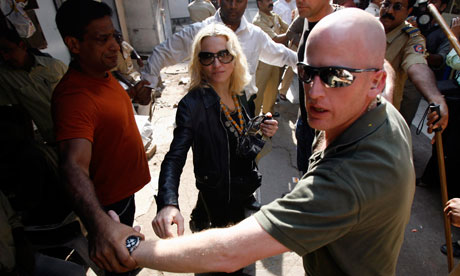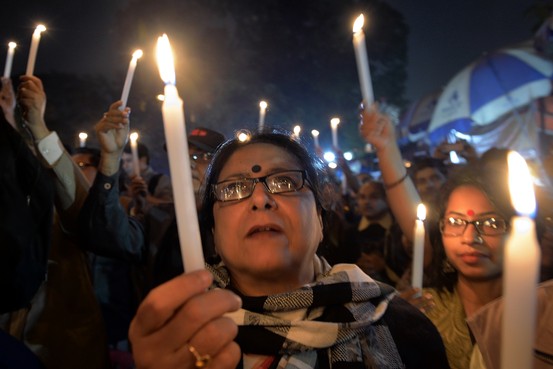Their fears range from terrorist attacks and cultural and religious minefields to hostile weather conditions and isolated locales. His company’s close protection officers are trained in special driving techniques, emergency first aid and etiquette.
Most of his clients are from the US and UK. “Many are high net-worth individuals (HNIs) who demand tight security services for their families, whether they are here for a destination wedding, a hiking trip to Ladakh, a visit to a fort in Jaipur, or a beach vacation to Goa,” says Singh. “Though Goa is their favourite destination, it makes them especially jittery,” he adds.
Nimisha Ramesh, 27, who works with a Nevada-based IT firm, makes frequent trips to India, for both business and leisure. “I don’t want to take any chances when I travel with a client, so I always take a bodyguard along. They are nervous because of the reports they have read about tourists being harassed,” says Ramesh.
Anubhav Khiwani, managing partner, Denetim Services in Gurgaon, says his bodyguard requests come mostly from Europeans. “If their itinerary has a lot of highway time, tourists prefer to have a bodyguard in the car, especially one who can converse in the local language and English,” says Khiwani… Read More(website Link)
Women in Delhi NCR are increasingly depending on women who work as private security guards and are trained in martial arts when they venture out for late-night parties or even weddings.
Though still a nascent trend, top private security firms based out of Noida and Delhi claim women are increasingly asking for female security officers. Their services could cost you anything upwards from Rs 3,000 for eight hours. “These women are trained to handle unpleasant situations. Some of them are also good drivers. There are not too many of them available yet, but demand is high. We have provided female private security to about 7-10 clients so far,” said Anubhav Khiwani, a security agency owner in Delhi… Read More(website Link)
.
 A growing number of Indians and tourists visiting the country are hiring bodyguards for protection after a series of violent attacks. Security agencies say business is booming as western visitors and local business people join celebrities and the super-rich in acquiring greater security.
A growing number of Indians and tourists visiting the country are hiring bodyguards for protection after a series of violent attacks. Security agencies say business is booming as western visitors and local business people join celebrities and the super-rich in acquiring greater security.
“We get a lot of calls for personal security officers, often at 2 or 3am, from western business executives or people from west Asia,” said Anubhav Khiwani, co-owner of Denetim Services, a newly established company in Delhi. “Once or twice a month a single woman or a holidaying family will also ask for a bodyguard… Read More(website Link)
3). NDTV Video
NDTV Interview detailing Denetim Services and the protection provided to foreigners traveling to India.
 NEW DELHI—To get ready for her trip to the Taj Mahal this month, Susan McAdams bought a Lonely Planet guidebook, a new camera and mosquito repellent—then she hired a bodyguard.
NEW DELHI—To get ready for her trip to the Taj Mahal this month, Susan McAdams bought a Lonely Planet guidebook, a new camera and mosquito repellent—then she hired a bodyguard.
“I’ve heard terrible things,” said Ms. McAdams, a 29-year-old business consultant from Australia. “Women are being groped and mobbed on the roads; I felt I couldn’t take the chance,” she said.
Gang rapes and other violent crimes against women—including attacks on foreign visitors—during the past year have tarnished India’s reputation as a tourist destination, especially among female travelers, tour operators and travel agents say.
International tourist arrivals to India last year grew at their slowest pace since the 2008 global economic downturn, rising just 3%, compared with a year earlier. That compares with a nearly 6% rise in arrivals in 2012 and a more than 9% jump in 2011.
“Safety is a huge, huge cause for concern,” said Parvez Dewan, the top civil servant in India’s Tourism Ministry. “Attacks on foreigners are giving India a bad name abroad.”
That could pose a threat to the economy. Tourism accounts for more than 6% of India’s gross domestic product, according to government calculations. The country has invested a considerable sum in efforts to boost the sector, advertising abroad with the slogan “Incredible India.”
If business doesn’t pick up, said Vikas Rai, managing director of New Delhi-based travel agency Discover India, “our livelihoods will be ruined.” He said earnings at his firm were down 60% compared with 2012.
After the December 2012 gang rape and murder of an Indian student on a bus in Delhi, local and international media have put more focus on the treatment of women in the world’s second-most-populous nation after China.
Nationwide soul-searching after that crime prompted India to overhaul its laws to safeguard women. Parliament last year enforced the death penalty for rape, as well as widened the definition of assaults to include offenses such as stalking and voyeurism. Still, activists say, rapes are grossly underreported, particularly in rural India, and victims of sex crimes remain widely ostracized.
Last month, an Indian court convicted three men for gang-raping an American tourist in June. In August, six men were sentenced to life in prison for a similar attack on a Swiss tourist. A few days after that attack, a British woman visiting the northern city of Agra, home to the Taj Mahal, jumped from a second-floor hotel balcony to escape an alleged assault, police said.
“The question travelers are increasingly asking is, ‘Is India really safe?’ ” said Mariellen Ward, a Toronto-based travel writer who runs an India-focused blog. Ms. Ward said she has received “more than a hundred emails” in recent months inquiring about safety for women in India.
Tourism officials are mounting a campaign to reassure visitors on safety. Security at popular tourist destinations has been stepped up and the government is planning to launch a tourist help line, which travelers can use to lodge complaints, later this year.
The Tourism Ministry also launched a campaign targeting Indian men. In a 60-second television spot that began airing recently, a female tourist is groped by another passenger in the back of an auto-rickshaw—a three-wheeled taxi common in Indian cities. “Don’t touch me. Get off me,” the young woman says.
Moments later, a driver who witnesses the crime pulls her from the vehicle, telling the assailant: “You will have to kill me, too,” before driving the tourist to safety.
At the end of the video, Bollywood star Aamir Khan says: “Such people embody the true meaning of ‘the guest is God’ “—the slogan of India’s Tourism Ministry. “India salutes them,” he says.
Some viewers on YouTube, where the ad was posted, said the commercial portrayed India in bad light. “Who will come to India after seeing this?” one viewer asked.
But “to paint a rosy picture of India would have been inaccurate,” said Rajiv Tandon, the chief executive of Mumbai-based Rakeysh Omprakash Mehra Productions, which made the ad, saying it only mirrored reality.”We only aped reality.” The commercial, Mr. Tandon added, is broadcast only in India.
Tour operators say foreigners arriving now are exercising great caution—many buying pepper spray or hiring guards.
In March, Denetim Services, a New Delhi-based security company, started a division offering bodyguards for travelers. Anubhav Khiwani, the co-founder, says his decision was driven by fears surrounding the recent attacks on foreign women.
“It turned out to be lucrative business for us,” he said. From March through December, Denetim arranged bodyguards for 21 tourists, nearly half of whom were women traveling alone.
Ms. McAdams, the Australian consultant, said she wouldn’t advise friends and family to visit India without a bodyguard, at least in the near future. “Advertisements and gender-sensitization campaigns are all great, but the damage has already been done,” she said. “It may take years and years to undo it.” Read More(website Link)
 NEW DELHI — The recent gang rape of a Danish tourist in the Indian capital has again focused attention on sexual violence against women in India and heightened perceptions that the country is unsafe as a travel destination.
NEW DELHI — The recent gang rape of a Danish tourist in the Indian capital has again focused attention on sexual violence against women in India and heightened perceptions that the country is unsafe as a travel destination.
Days after the incident, which occured close to a popular market in the heart of New Delhi, the city’s police chief, B.S. Bassi, gave a brief message.
He said the city’s police force is taking every possible step to keep people safe.
But this has failed to reassure international travelers heading to India.
On Thursday, the British Foreign Office issued an advisory cautioning its citizens about travel to the country.
The 51-year-old Danish woman was a so-called backpacker tourist who was robbed, beaten and gang raped at knife point as she stopped to ask for directions to her hotel. Three men have been arrested in connection with the assault.
In December 2012, the brutal gang rape of an Indian physiotherapy student in New Delhi underlined the huge issue of sexual violence targeting women. Since then there have been reports from across the country of similar crimes.
Among the targets of sexual assaults have been some foreign tourists, including those from the United States, Switzerland and Britain.
Tourism industry officials say the reports of rapes have tarnished India’s image in the past year and heightened fears among women tourists heading to the country.
An advisor to the Travel Agent Association of India, Rajinder Rai, fears the latest gang rape will aggravate a slowdown being experienced by the industry.
He said similar to how Iraq got associated with bombings, India is unfortunately getting associated with rapes.
“If you get headlines every month, obviously it has got to have a huge impact on inbound tourism, that is already very discernible. It is impacting the overall credibility of the country as a safe country,” said Rai.
International tourist arrivals to India grew only marginally last year, increasing by three percent compared to six percent in 2012 and nine percent in the previous year.
In the last year, some foreign tourists have even started hiring security guards as they travel through the country. Denetim Services is one such company offering bodyguards for tourists.
Anubhav Khiwani of Denetim said business has been thriving since the reports of sexual assaults heightened fears that traveling in India is not safe. He said most business comes from tourists in Western countries and cites a recent query that came from a group of four women wanting to visit India in March.
“The e-mail I have received today clearly states that they have traveled to the Middle East, China and Africa and they have not faced any problems. But they are feeling slightly more scared about India, specifically after what happened two days back,” stated Khiwani.
Director of the Indian Association of Tour Operators Gour Kanjilal said crimes happen in big cities all over the world. He said the sexual crimes are “aberrations” but are giving a bad name to the country.
“It hampers our future tourist movements. They [tourists] are asking how safe it will be, what steps government is taking,” Kanjilal said.
In the past year the government has tightened laws for such crimes and made efforts to ensure swifter justice to the victims in India’s slow moving legal system.
Last month, three men were convicted for gang raping an American tourist in June and in August six men were given life imprisonment for a similar attack on a Swiss tourist. Read More(website Link)
Nein, in Delhi bleibe ich nicht lange“, sagt Anne. „Nur genau so lange, bis wir unsere Weiterfahrt zum Taj Mahal organisiert haben. Und abends gehe ich nicht aus dem Hotel.“ Anne ist 23, für ihr Alter schon weit gereist, und Australierin. Vor der indischen Hauptstadt aber hat sie Furcht. „Ich glaube nicht, dass mir etwas passiert. Aber natürlich hört man all diese entsetzlichen Geschichten über Vergewaltigungen.“ Sie kosten Indien Ansehen. Und sie kosten bares Geld – denn Touristen überlegen, seit die Berichte über die Angriffe auf Frauen nicht mehr abreißen wollen, ob sie das Ganges-Land mit seinen Kulturschätzen noch besuchen. Um nur noch 3 Prozent wuchsen die Gästezahlen in Indien im vergangenen Jahr – so langsam wie zuletzt im Jahr der Finanzkrise 2008.

Sicherheit ist ein riesiges Thema. Die Angriffe auf Fremde beschädigen Indiens Ansehen in der Welt“, sagt Parvez Dewan, einer der Spitzenbeamten im Touristenministerium. 2012 war die Zahl der Touristen im Jahresvergleich noch um fast 6 Prozent gestiegen, 2011 verbuchte der bunte Subkontinent ein Plus von mehr als 9 Prozent. Dabei wären die Gäste für Indiens leidende Wirtschaft wichtiger denn je: Zum einen als Botschafter für ein Land, das zuletzt fast nur schlechte Nachrichten produzierte. Zum anderen bringen sie Geld: Rund 6 Prozent dürfte der Tourismus zur gesamten Wirtschaftsleistung des Subkontinents beisteuern.
Atul Taondon bekommt die Folgen der Furcht täglich zu spüren. Der Geschäftsführer des Traditionscafés Wenger & Co am Connaught Place in Delhi klagt „Seit der Gruppenvergewaltigung hier vor gut einem Jahr hat sich vieles geändert. Wir haben deutlich weniger Touristen als Kunden. Unser Sortiment haben wir nun angepasst – wenige Törtchen und mehr gefüllte Teigtaschen für unsere indischen Kunden.“ Das Reisebüro Discover India in Delhi erklärte, sein Umsatz sei gegenüber 2012 um 60 Prozent gesunken.
Doch auch mit der Angst der Touristinnen lässt sich Geld verdienen. So hat etwa Anubhav Khiwani aus der Furcht eine Geschäftsidee gemacht. Der quirlige Dreißigjährige sitzt im neuen Starbucks Cafe in Delhis Zentrum, blickt sich um und sagt: „Schauen Sie, hier prallen Welten aufeinander. Wenn wir Touristinnen nach Indien bekommen wollen, müssen wir ihnen Sicherheit bieten.“ Die lässt er sich gut bezahlen: Der frühere Mitarbeiter der Unternehmensberatungen PWC und Cap Gemini hat die Sicherheitsfirma Denetim Services gegründet.
Damit bietet er nicht nur Reichen und Schönen Bodyguards, sondern wendet sich auch an die ganz normale Touristin. „Für 24 Stunden dezenter Begleitung stellen wir 100 Dollar in Rechnung“, sagt Khiwani. „Hinzu kommen Hotel, Essen und Transport. So kommt eine Frau auf rund 140 Dollar täglich, wenn wir ihre Sicherheit garantieren.“Viele Kundinnen hat er bislang noch nicht. Wenn aber, dann war es eine lange Betreuung: „Wir haben auch schon Aufträge über eine ganze Indien-Reise über 15 Tage gehabt, von Flugplatz bis Flugplatz“, sagt er.
Khiwani setzt auf die Angst: „Die Vergewaltigung vom Dezember 2012 hat alles verändert. Ausländer liebten Indien und tun dies immer noch, aber die Nachrichten machen ihnen Angst. Die leeren nächtlichen Straßen, die Migranten, die auf dem Bürgersteig schlafen – kehrt eine gut gekleidete Frau hier von einer Party heim, klingt es nach Verderben, denn niemand scheut sich, die Situation auszunutzen“, heißt es auf der Internetseite seines Unternehmens. Auch andere verstehen, mit den Ängsten der Frauen Geld zu verdienen; Hilfe und Geschäftemacherei reichen sich die Hand.
Die staatliche Waffenfabrik Indian Ordnance Factories stellt in Kanpur einen „Damenrevolver“ her. Er trägt den Namen Nirbheek („furchtlos“), nach dem Kosenamen, der der 2012 bestialisch ermordeten Inderin nach ihrem Tod verliehen wurde. Der Name ist auf dem Lauf eingraviert. „Die Waffe besitzt eine Titanlegierung und einen Holzgriff, der richtig gut aussieht“, preist Abdul Hameed, der Geschäftsführer der Fabrik in Kanpur, die Entwicklung. Das „Leichtgewicht“ kostet 122360 Rupien (1466 Euro) und kann direkt bei der Fabrik bestellt werden. Ausgeliefert wird die Pistole in einem dunkel-violett bezogenen Kasten.
Allerdings kann sie sich kaum eine Inderin leisten: Denn eine Fabrikarbeiterin verdient nur rund 4000 Rupien im Monat. Waffen oder Bodyguards sind nur etwas für die Oberschicht, dem Rest der Inderinnen bleibt allenfalls das Vertrauen auf Pfefferspray oder einen Selbstverteidigungskurs. Anbieter billiger Sprays und Schulen für Kampftechniken verbuchen hohe Zuwächse. Genauso wie Transportunternehmen, die versprechen, die Mitarbeiterinnen auch westlicher Konzerne nach der Schicht sicher nach Hause zu geleiten. „Wir werden eine Viertelstunde nachdem wir zu Hause angekommen sind, von unserem Transportteam angerufen, um zu prüfen, ob alles glattgegangen ist.
Sind wir die Letzten, die abgesetzt werden, begleiten uns der Fahrer und ein Sicherheitsmann“, erzählt die Mitarbeiterin eines global tätigen Unternehmens in Bangalore. Und dennoch ist Vorsicht geraten: „Ich besuche unsere künftigen Bodyguards zu Hause, schaue, ob sie verheiratet sind und Kinder haben, prüfe sogar ihre Nachbarn“, sagt Khiwani. „Erst so kann ich mir langsam ein Bild von ihnen und ihrer Zuverlässigkeit machen. Das Schlimmste für mich wäre, wenn sie im Dienst versagten oder ihren Job ausnutzten.“ Read more Website link
Women bouncers rapidly grow in numbers, earn more than male counterparts
Initially, female bouncers were hired just to make sure that women guests leave the premises safely after drinking. But that has changed. Now they are also needed to control any altercation involving male guests as well. Anubhav Khiwani, who owns a firm that provides security personnel, says, “Female bouncers are now needed to control not just female guests but also men. If an argument starts and bouncers have to intervene, men just push the male bouncers or argue with them. Sometimes they even abuse. But when a female bouncer stops them, they know they can’t touch her.” “Female Bouncers Times of India news coverage website link
 Blue Box and the news contains reference of Denetim Services regarding female bouncers being the new thing in today’s requirement.
Blue Box and the news contains reference of Denetim Services regarding female bouncers being the new thing in today’s requirement.
Dealing with polite firmness is more the brief for these female bounces than the ability to deliver a flying kick. “A good build, along with the right height-weight ratio, is important,” says Anubhav Khiwani, founder of Denetim Services. “Physical combat training is helpful but not necessary as long as they are fit; and prior experience with the CRPF or BSF can boost a bouncer’s resume. Female Bouncers Outlook Magazine Link